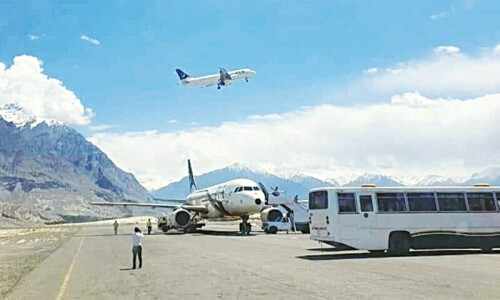
ABU DHABI: President Asif Ali Zardari has stressed the need for developing a global partnership on renewable energy, particularly solar and wind resources involving public and private sectors, to ensure availability of affordable energy to the common man.
Addressing the opening session of a four-day World Future Energy Summit here on Monday, the president said that production of energy and its availability had become a driving force of economics and the ever increasing demand was sustained by greater use of alternative energy resources.
He said the UAE had demonstrated to the world that trade and commerce, innovation and invention, ideas and enterprise could make a desert bloom.
He said that attempts were made in the past to produce cleaner bio-fuel, but its cost sometimes was more than the energy it would in turn produce. The intent was positive even if the direction turned out to be wrong.
“It now seems that the choice of corn as a source material was not the wisest since the land and water taken away from food security has led to hunger and instability in poor countries.”
The president said the failure of corn was not necessarily the failure of ethanol, adding that other seeds which did not need fresh water could be used for clean bio-fuel.
Other non-food crops which grow in abundance in poor soil without fertilisation can be excellent sources of potential fuel.
Mr Zardari said that with higher prices and growing scarcity of fossil fuel, solar power was finally emerging as a viable and efficient source of energy.
Innovation, he added, was also making wind power more efficient and effective, making it a critical part of the grid system in many countries and critical to the future expansion of renewal energy all over the world.
About the challenges faced by Pakistan, the president said the country had 180 million people. “Our demographics are the driving force of our needs. Pakistan's economy needs to grow at an annual rate of eight per cent just to guarantee that our people are able to sustain their current standard of living.”Pakistan's energy demands, he said, would have to be met urgently. The country's current energy capacity of 20,000MW would have to double within a decade to meet economic targets.
Pakistan, he said, had been a victim of one environmental disaster after another — earthquakes, floods, deadly pollution, climate change and drought.
“We have turned increasingly to initiatives in water and energy conservation, high efficiency irrigation systems and powering of water systems and houses by solar and wind energy.
Individually, these are all small steps, but taken together as national policy they represent a long-term commitment, fundamental reorientation to the future of our people and to the sustainability of life on our planet.” ENERGY REVOLUTION:
United Nations Secretary General Ban Ki-moon called for a clean energy revolution which would reduce climate risks, cut poverty and improve global health.
“Our challenge is transformation. We need a global clean energy revo- lution — a revolution that makes energy available and affordable for all,” he told the participants in the energy summit.
“This is essential for minimising climate risks, for reducing poverty and improving global health, for empowering women and meeting the Millennium Development Goals, for global economic growth, peace and security, and the health of the planet,” he said in his keynote speech.
“You can lead this revolution, and in many ways, many of you are already doing so,” he told more than 3,000 delegates gathered at the international summit and exhibition.
Sultan al-Jaber, the chief executive officer of Masdar, an organisation created by Abu Dhabi to champion the cause of promoting clean energy, stressed the need for using a mix of energy resources.
“Energy must come from a mix of sources... Solar energy is clean, efficient and cost-effective. A mix should also include peaceful nuclear energy, and of course, renewable energy,” he said.
He also called for greater competition in the production of renewable energy, which would result in technological gains.















































Dear visitor, the comments section is undergoing an overhaul and will return soon.